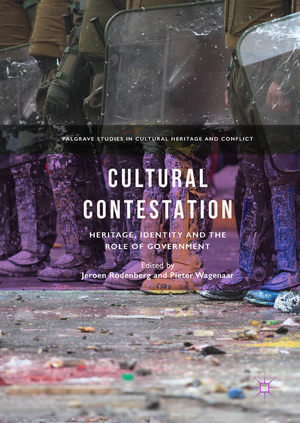Cultural Contestation: Heritage, Identity and the Role of Government: Palgrave Studies in Cultural Heritage and Conflict
Editat de Jeroen Rodenberg, Pieter Wagenaaren Limba Engleză Hardback – 18 iul 2018
| Toate formatele și edițiile | Preț | Express |
|---|---|---|
| Paperback (1) | 890.54 lei 6-8 săpt. | |
| Springer International Publishing – 23 dec 2018 | 890.54 lei 6-8 săpt. | |
| Hardback (1) | 901.11 lei 6-8 săpt. | |
| Springer International Publishing – 18 iul 2018 | 901.11 lei 6-8 săpt. |
Din seria Palgrave Studies in Cultural Heritage and Conflict
- 20%
 Preț: 568.11 lei
Preț: 568.11 lei - 15%
 Preț: 696.68 lei
Preț: 696.68 lei -
 Preț: 415.77 lei
Preț: 415.77 lei - 18%
 Preț: 780.19 lei
Preț: 780.19 lei - 15%
 Preț: 589.33 lei
Preț: 589.33 lei - 18%
 Preț: 737.57 lei
Preț: 737.57 lei - 15%
 Preț: 594.24 lei
Preț: 594.24 lei - 18%
 Preț: 786.84 lei
Preț: 786.84 lei - 18%
 Preț: 949.42 lei
Preț: 949.42 lei - 18%
 Preț: 733.03 lei
Preț: 733.03 lei - 18%
 Preț: 792.34 lei
Preț: 792.34 lei - 20%
 Preț: 767.40 lei
Preț: 767.40 lei - 15%
 Preț: 588.18 lei
Preț: 588.18 lei -
 Preț: 233.58 lei
Preț: 233.58 lei - 18%
 Preț: 726.06 lei
Preț: 726.06 lei -
 Preț: 380.45 lei
Preț: 380.45 lei -
 Preț: 386.39 lei
Preț: 386.39 lei - 18%
 Preț: 777.69 lei
Preț: 777.69 lei - 18%
 Preț: 784.13 lei
Preț: 784.13 lei - 18%
 Preț: 894.79 lei
Preț: 894.79 lei - 18%
 Preț: 725.13 lei
Preț: 725.13 lei -
 Preț: 484.47 lei
Preț: 484.47 lei -
 Preț: 385.84 lei
Preț: 385.84 lei - 15%
 Preț: 640.71 lei
Preț: 640.71 lei - 18%
 Preț: 730.97 lei
Preț: 730.97 lei -
 Preț: 390.25 lei
Preț: 390.25 lei -
 Preț: 388.13 lei
Preț: 388.13 lei -
 Preț: 385.84 lei
Preț: 385.84 lei
Preț: 901.11 lei
Preț vechi: 1098.92 lei
-18% Nou
Puncte Express: 1352
Preț estimativ în valută:
172.43€ • 180.40$ • 143.24£
172.43€ • 180.40$ • 143.24£
Carte tipărită la comandă
Livrare economică 02-16 aprilie
Preluare comenzi: 021 569.72.76
Specificații
ISBN-13: 9783319919133
ISBN-10: 331991913X
Pagini: 507
Ilustrații: XVII, 342 p. 16 illus., 15 illus. in color.
Dimensiuni: 148 x 210 mm
Greutate: 0.74 kg
Ediția:1st ed. 2018
Editura: Springer International Publishing
Colecția Palgrave Macmillan
Seria Palgrave Studies in Cultural Heritage and Conflict
Locul publicării:Cham, Switzerland
ISBN-10: 331991913X
Pagini: 507
Ilustrații: XVII, 342 p. 16 illus., 15 illus. in color.
Dimensiuni: 148 x 210 mm
Greutate: 0.74 kg
Ediția:1st ed. 2018
Editura: Springer International Publishing
Colecția Palgrave Macmillan
Seria Palgrave Studies in Cultural Heritage and Conflict
Locul publicării:Cham, Switzerland
Cuprins
1. Cultural Contestation: Identity, Heritage and the Role of Government (Jeroen Rodenberg and Pieter Wagenaar).- 2. Cultural Contestation in China: Ethnicity, Identity and the State (Christina Maags).- 3. Ethnicity, Heritage and Human Rights in the Union of Myanmar (William Logan).- 4. The Obliteration of Heritage of the Jumma People and the Role of Government: The Story of the Chittagong Hill Tracts (Rumana Hashem).- 5. Impediment or Resource?: Contextualisation of the Shared Built Heritage in Turkey (Deniz Ikiz Kaya and Mehmet Calhan).- 6. From Underworld to Museum Showcase: Afro-Cuban Religions, Heritage Production and Cuban Cultural Policy (Michelle A. Tisdel).- 7. Dispossessing the Wilderness: Contesting Canada’s National Park Narrative (Desiree Valadares).- 8. Famagusta, Cyprus: Cultural Heritage at the Center of Political and Cultural Contestation (Carlos Jaramillo).- 9. The War over Nagorno-Karabakh and Its Lasting Effects on Cultural Heritage (Marja van Heese).- 10. Dealing with a Difficult Past: Japan, South Korea and the UNESCO World Heritage List (Ioan Trifu).- 11. Lost Temporalities and Imagined Histories: The Symbolic Violence in the Greek-Macedonian Naming Dispute (Biljana Volchevska).- 12. Of, by and for Which People? Government and Contested Heritage in the American Midwest (Elizabeth Kryder-Reid and Larry J. Zimmerman).- 13. Ethno-Nationalism Revisited?: A Journey through the New Estonian National Museum (Eesti Rahva Muuseum) (Emilia Pawłusz).- 14. Acting in a National Play: Governmental Roles during the Zwarte Piet Contestation (Pieter Wagenaar and Jeroen Rodenberg).- 15. Conclusion: Roles Governments Play in Shaping the Symbolic Landscape (Jeroen Rodenberg and Pieter Wagenaar).
Notă biografică
Jeroen Rodenberg is Lecturer in the Department of Political Science & Public Administration at the VU University Amsterdam, The Netherlands. He specializes in governance and policy of cultural heritage.
Pieter Wagenaar is Assistant Professor in the Department of Political Science & Public Administration at the VU University Amsterdam, The Netherlands. He specializes in the history of governance and the governance of history.
Pieter Wagenaar is Assistant Professor in the Department of Political Science & Public Administration at the VU University Amsterdam, The Netherlands. He specializes in the history of governance and the governance of history.
Caracteristici
Addresses how government policies provoke cultural contestation Avoids striking a strict distinction between tangible and intangible heritage while also allowing for the possibility that conflict surrounding objects and practices might differ from each other with a number of case studies in each Combines insights from political science to heritage studies, public administration to architecture to underscore the necessity of a multidisciplinary approach to the topic
